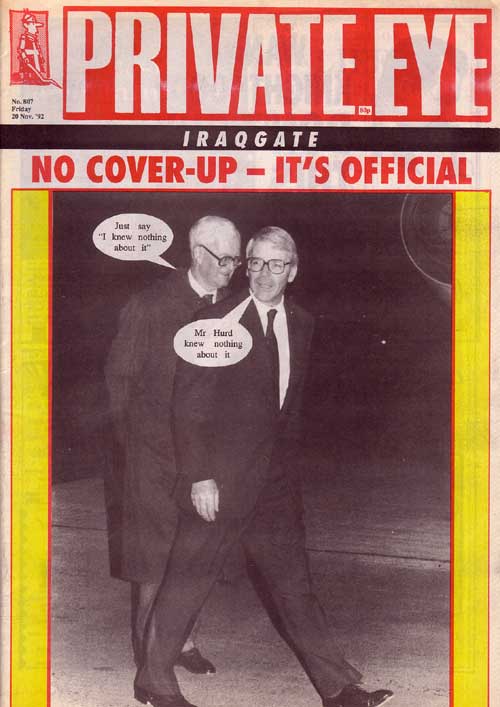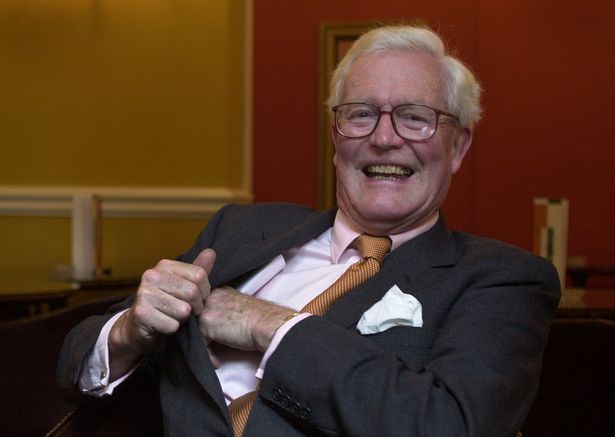
Douglas Hurd, 1989-95
Conservative, under Major and Thatcher
For Douglas Hurd’s earlier career, read here. When Nigel Lawson resigned in 1989, Margaret Thatcher was in political trouble. Her reaction was to move John Major, who had only been foreign secretary three months, to the Treasury. Hurd, who had been a pretty successful home secretary, was a former diplomat and junior minister at the Foreign Office. Thus, he seemed the logical choice to be her new foreign secretary.
There was perhaps more to it than that. In the first place, she wanted a foreign secretary who was not a threat. Major’s rapid promotion perhaps identified him as a future leader, but his relative inexperience probably made everyone think that was some time ahead in the future. Hurd was now very experienced, but had never worn his ambition on his sleeve, and had been unfailingly loyal. Ironically, a year later, both would be contesting a leadership election.
In some ways, Hurd’s appointment was a sign of weakness. In 1981, Thatcher had famously purged the Wets, the old Heathites. In the years that followed her cabinets were, she hoped, increasingly formed in her own image. After 1987, she became ever more strident and unwilling to trim her sails. The result was the poll tax, and mounting unpopularity. Another issue was Europe. She had fallen out with Lawson over the ERM (you can read about that here) an, a few months before, ousted Howe from the Foreign Office following their increasing differences over Europe (you can read about them here, and here). She had perhaps appointed Major to the Foreign Office believing he would stick to what would be her increasingly strident guns: whilst he was not rabid Europhile, as prime minister he would take a more balanced and nuanced approach, as did Hurd (who had been minster for Europe when in the Foreign Office between 1979 and 1983). Now, both her foreign secretary and chancellor were loyal, but looking towards Europe from a somewhat different angle.
By 1990, Hurd had become impatient of Thatcher’s increasingly strident nationalism. Sir Patrick Mayhew recalled Hurd bemoaning the fact that ‘Cabinet now consists of three items: Parliamentary Affairs, Home Affairs, and xenophobia’. When Howe wielded the knife, and Heseltine challenged her, Hurd remained loyal. He was not one of those cabinet ministers who told her, that famous night, that she had to go. But when she did go, he was quick enough to run for the leadership. He got 56 votes: Major won the Thatcherite votes, but he also appealed to the same centre that Hurd looked to occupy, as did Heseltine as well. His campaign was also marred by a somewhat ham-fisted attempt to portray him as a man of the people: not a role he was born for in any sense.
Back in 1989, just 13 days after Hurd entered the Foreign Office, the Berlin Wall was opened. By November 28th, the German Chancellor Helmut Kohl came out in favour of German reunification. Thatcher was opposed. She told the French president, Francois Mitterrand, that Kohl didn’t understand the fears reunification aroused in the rest of Europe: in essence, she hadn’t forgotten the war. She told Charles Powell, her private secretary, that she feared the world would have reunification thrust upon it.

The Foreign Office saw it very differently. Britain’s ambassador in Bonn (the West German capital) believed reunification was inevitable, and London’s obvious unease threatened to ‘alienate the Federal republic of Germany unnecessarily’. Hurd’s minister for Europe, William Waldergrave, believed the Foreign Office needed to force Thatcher to see reality. Hurd, and Powell, worked to force her to see sense, but she did so with some very public reluctance and, in the process, damaged Britain’s relations with the Germans; and that was just when Britain were going to need German support in the European negotiations to come.
Nonetheless, Hurd’s management of the issue reinforced his credentials as a heavyweight. When Major won in 1990, he kept Hurd on. In turn, Hurd found Major a more congenial colleague.

Another reason it would have been foolish to replace Hurd was that Britain was about to go to war. Back in August, Iraqi forces had invaded Kuwait. By November, there were around 350,000 coalition servicemen gathered in the Middle East, including 15,000 from Britain. Hurd and Thatcher had already played a leading role in supporting the American diplomatic formation of a coalition to force Saddam Hussein to withdraw, or face war. Hurd played a key role in the creating a consensus in the UN Security Council: on November 29th, it passed resolution 678, mandating the use of military force if Iraqi forces did not withdraw. On 17th January 1991, the first air attacks were launched. On 24th February, Operation Desert Storm saw coalition forces invade Iraq and Kuwait: Britain was at war.
Both Hurd and Major had a good war, and their staunch support of the United States saw already good relations with President Bush grow even warmer (a precedent Tony Blair surely took note of).

The two men also sought to improve Britain’s relations with Europe. The problem was that Europe, under the leadership of Kohl and Mitterrand, was making serious moves towards what the Single European Act had called ‘ever closer union’. Britain’s language towards Europe was transformed: Thatcher’s strident rhetorical hostility was replaced by a newly warm and pro-European tone. There was iron behind the velvet, though. When the deal was cut, Britain got pretty much everything it wanted, most of all opt-outs from the single currency and the social chapter. The Maastricht Treaty was a diplomatic triumph, but would prove in time to be deeply damaging politically (you can read about it here, and here).
Hurd had publicly supported the reunification of Germany, the creation of new democracies in the old Eastern bloc and the reconfiguration of the old Soviet Union. At the same time, the former Yugoslavia was collapsing as Slovenia and Croatia declared their independence, and war ensued in Croatia. Then, Bosnia-Herzegovina declared independence. The war that followed lasted more than three years. Sarajevo was besieged from 1992 to 1996 for 1,425 days. Almost 14,000 were killed (about 40% of them were civilians, including 1,500 children): many more were wounded. The war saw mass ethnic cleansing and unspeakable atrocities, most of them carried out by Serb forces. The worst of them all was at Srebrenica, in July 1995. More than 8,000 Bosniak Muslim men and boys were murdered by Bosnian Serb forces; thousands of women and girls were raped, sexually assaulted and tortured. Genocide had returned to Europe.
All this happened under the noses of Dutch UN peacekeeping forces. Their inaction was symbolic of the West’s failure to intervene. Hurd consistently argued against intervention. In 1992, Britain was instrumental in framing the Carrington-Cutilero Plan, or Lisbon Agreement, which hoped to head off war in Bosnia. It failed: Bosnia declared independence and the Serb government rejected it. A revised version was accepted by the Serbs, Croats and Bosnian governments, but then the Bosnian leader withdrew his support. War ensued.
Britain then supported a joint US-European Community initiative. The Vance-Owen Plan was accepted by the Bosnian Serb leadership, but rejected by their assembly. That plan envisaged a united Bosnia, the subsequent Owen-Stoltenberg Plan envisaged breaking it up. The Bosniaks rejected that.
Hurd supported these initiatives, and with it looked to maintain a policy of non-involvement, looking to Britain and Europe acting as a peacemaker and arbiter. The problem was that it was not a war of equals: non-interference simply enabled the Bosnian Serbs to maintain their campaign against the Muslims. In the end, it was only when the Croats, who had fought the Bosniaks in Mostar in 1993, turned against the Serbs, that Britain relented to pressure from the Clinton administration and NATO forces bombed Serbia. A fragile deal, in the form of the Dayton Accords, finally brought an equally fragile peace: by then Hurd had left the Foreign Office. Hurd continued to maintain that an earlier intervention would not have helped, though the events of 1995, and the subsequent NATO bombing of Serbia (which led them to withdraw from Kosovo) might be thought to give the lie to that claim.

Come the 1995 reshuffle, Hurd retired to the backbenches; in 1997, he went to the Lords. Hurd had written political thrillers, he now wrote more. He also wrote biographies of Peel and Disraeli.
He supported Major, but seemed at one remove from the Eurosceptic leaders that followed. He had some admiration for Blair, but believed that the Iraq War was Blair’s Suez, and he called for Blair’s resignation. In 2005, he supported Cameron. As a committed European, however, he seemed increasingly out of step with modern Europhobic Conservatism.
Hurd was a measured and effective foreign secretary, in a government that was increasingly ineffective, and as a member of a party that became increasingly unmanageable. As foreign secretary, he helped Thatcher see sense over German reunification, and helped steer Thatcher and Major through the Gulf War. Maastricht was a diplomatic victory for Britain. If his policy over Bosnia might be questioned, the political and military risks of gung-ho intervention since now seem rather more clear. O for his like now.
Here, on German TV, Hurd looks back at German unification:




